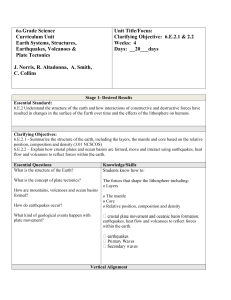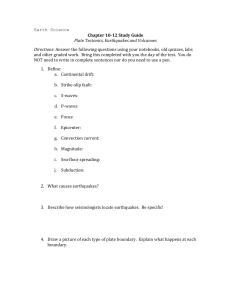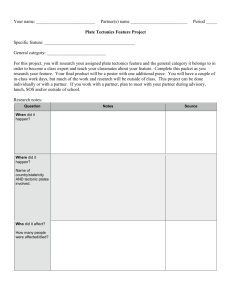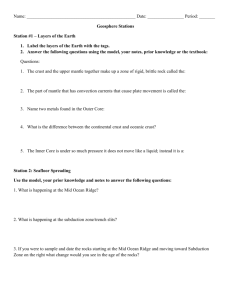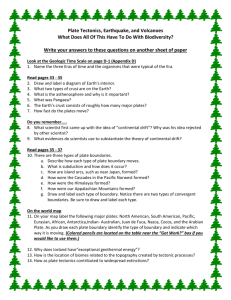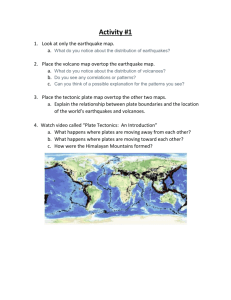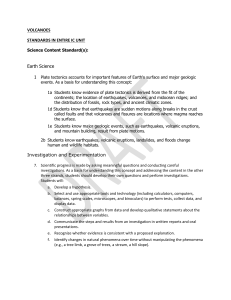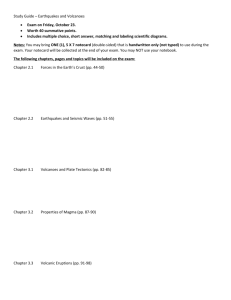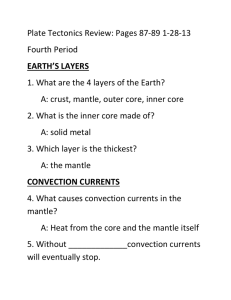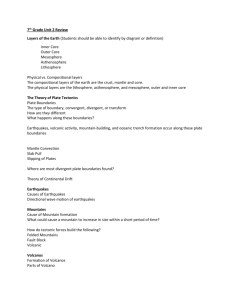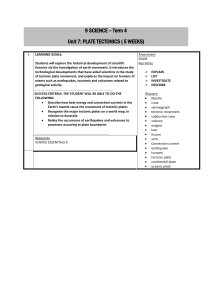Clarifying Objective
advertisement
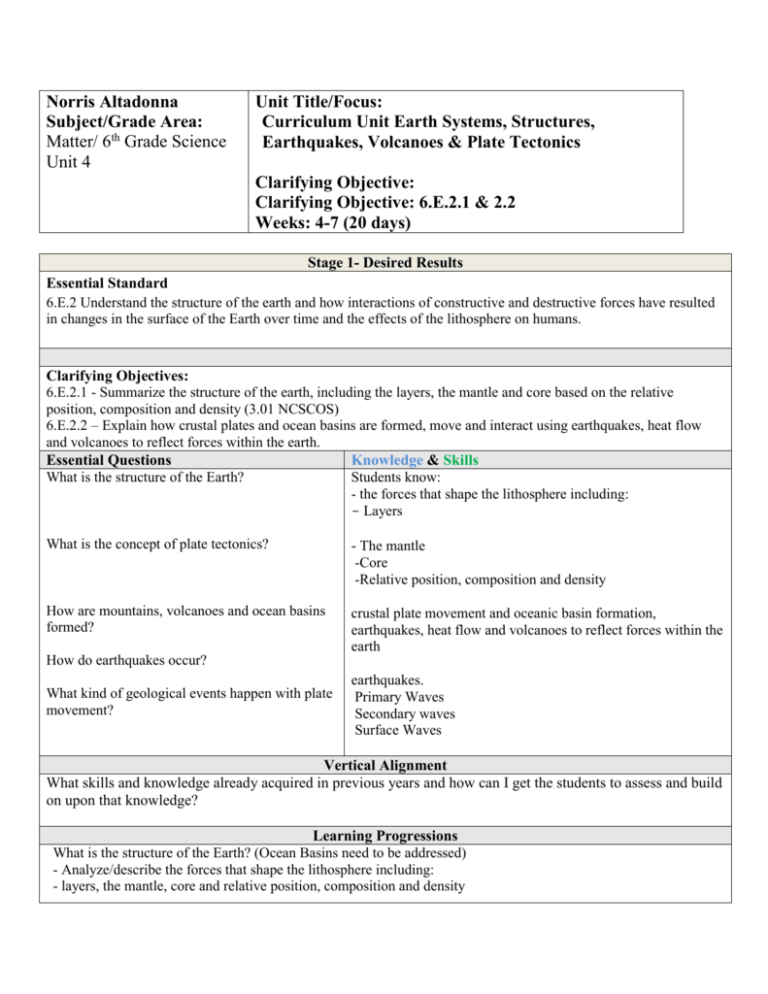
Norris Altadonna Subject/Grade Area: Matter/ 6th Grade Science Unit 4 Unit Title/Focus: Curriculum Unit Earth Systems, Structures, Earthquakes, Volcanoes & Plate Tectonics Clarifying Objective: Clarifying Objective: 6.E.2.1 & 2.2 Weeks: 4-7 (20 days) Stage 1- Desired Results Essential Standard 6.E.2 Understand the structure of the earth and how interactions of constructive and destructive forces have resulted in changes in the surface of the Earth over time and the effects of the lithosphere on humans. Clarifying Objectives: 6.E.2.1 - Summarize the structure of the earth, including the layers, the mantle and core based on the relative position, composition and density (3.01 NCSCOS) 6.E.2.2 – Explain how crustal plates and ocean basins are formed, move and interact using earthquakes, heat flow and volcanoes to reflect forces within the earth. Essential Questions Knowledge & Skills What is the structure of the Earth? Students know: - the forces that shape the lithosphere including: - Layers What is the concept of plate tectonics? - The mantle -Core -Relative position, composition and density How are mountains, volcanoes and ocean basins formed? crustal plate movement and oceanic basin formation, earthquakes, heat flow and volcanoes to reflect forces within the earth How do earthquakes occur? What kind of geological events happen with plate movement? earthquakes. Primary Waves Secondary waves Surface Waves Vertical Alignment What skills and knowledge already acquired in previous years and how can I get the students to assess and build on upon that knowledge? Learning Progressions What is the structure of the Earth? (Ocean Basins need to be addressed) - Analyze/describe the forces that shape the lithosphere including: - layers, the mantle, core and relative position, composition and density Crustal plate movement (geological events) How do we know the continents drift? -Describe how scientists developed the theory of plate tectonics. -Identify different plate boundaries. How volcanoes/mountains are formed? - Describe how the folding of rock can form mountains. - Explain how movement along faults can form mountains. - Explain how volcanoes erupt. - Identify the types and locations of different volcanoes. Where and how earthquakes are formed? - Explain what happens when plates move apart or one plate scrapes past another plate. - Evaluate causes of plate movement and the resulting geologic changes on Earth. Stage 2- Assessments Evidence Performance Tasks/ Formative Assessment Summative Assessment Water Fountain Teacher made Edmodo Assessment Sticky Notes Red light, Yellow Light, Green Light World Book Online Science Power Assessment Parking Lot Open Ended Writing Assessment Thumbs Up, Thumbs Down Edmodo Quiz Vocabulary inner core/ outer core/ mantle /crust /earthquake/ volcano/ lava Tier 1 Tier 2 Tsunami/ acid rain/ epicenter/ geyser/ Tier 3 divergent/ convergent/ transform/ boundaries/ rift valley/ magnetic reversal/ hot spot subduction/ continental-continental collision/ oceanic-oceanic subduction oceanic-continental subduction/ aftershock/ liquefaction/ folded mountain/ fault-block mountain/folding /faulting/ lithosphere/asthenosphere/ tectonic plate/ continental drift/ Pangaea mid-ocean ridge/ convection/ convection current/ theory of plate tectonics/ fault/ stress/ pyroclastic flow/ seismograph Resources: http://www.youtube.com/user/ParrMr?ob=0&feature=results_main Mr. Parr Song http://paul-a-heckert.suite101.com/understanding-convection-currents-a63549 http://www.youtube.com/watch?v=Kpoko_l34ZE http://www.youtube.com/watch?v=mB2pzhWUaiU&feature=related Plate Tectonic explanation video (8mins.) http://www.youtube.com/watch?v=KCSJNBMOjJs&feature=related Nat’l Geo. Colliding Continents (50mins) http://www.youtube.com/watch?v=b9DMiy_DVok&feature=related Tsunami footage from Survivors 2004 (11mins) Part 1 http://www.youtube.com/watch?v=S0p_6G5GIeo&feature=relmfu Earthquake/Tsunami footage from survivors 2004 (10mins) part 2 http://www.youtube.com/watch?v=ceym2c18OQM&feature=related Japan tsunami 2011 (5:45mins) Port warehouse district being flooded http://www.youtube.com/watch?v=w60q8PpG18o&feature=related Japan Earthquake/Tsunami with English speaking narrator/eyewitness (1:43mins) http://www.youtube.com/watch?v=rn3oAvmZY8k Liquefaction during Japan earthquake 2011 (3:08mins) http://www.youtube.com/watch?v=MqHw1hMEkAQ&feature=fvsr acid rain Washington, DC (2:30mins) http://www.youtube.com/watch?v=-EEYGrtvRMo Acid Rain Movie (3:20) http://www.youtube.com/watch?v=yvG_N7eqMWk Pyroclastic flow (2:30mins) http://www.youtube.com/watch?v=Cvjwt9nnwXY&feature=related Pyroclastic flow with English narration (1:12mins) http://www.youtube.com/watch?v=X4zA_YPCyHs&feature=related Geyser Animation (2:56mins) http://www.youtube.com/watch?v=tShhZvvIM84 (1:41mins) Technology Standards 6.TT.1 Select appropriate technology tools to gather data and information (e.g., Web-based resources, e-books, online communication tools, etc.). Example-World Book Online, Edmodo, Google Docs 6.TT.2 Select appropriate technology tools to organize data and information (e.g., word processor, database, spreadsheet, graphic organizer, audio and visual recording, online collaboration tools, etc.). Example-MicroSoft Word- Shape Art (graphic organizers) 6.TT.3 Select appropriate technology tools to present data and information effectively (multimedia, audio and visual recording, online collaboration tools, etc.). Example- Photostory Literacy Standards 1) Cite specific textual evidence to support analysis of science and technical texts. (example-science world magazine, argumentative writing response) 6) Analyze author’s purpose in providing explanation, describing a procedure, or discussing an experiment in text. (example-have students write a book review, pygmy shrew) Writing Standards 2. Write informative/explanatory texts to examine a topic and convey ideas, concepts, and information through the selection, organization, and analysis of relevant content. f. Provide a concluding statement or section that follows from the information or explanation presented.
